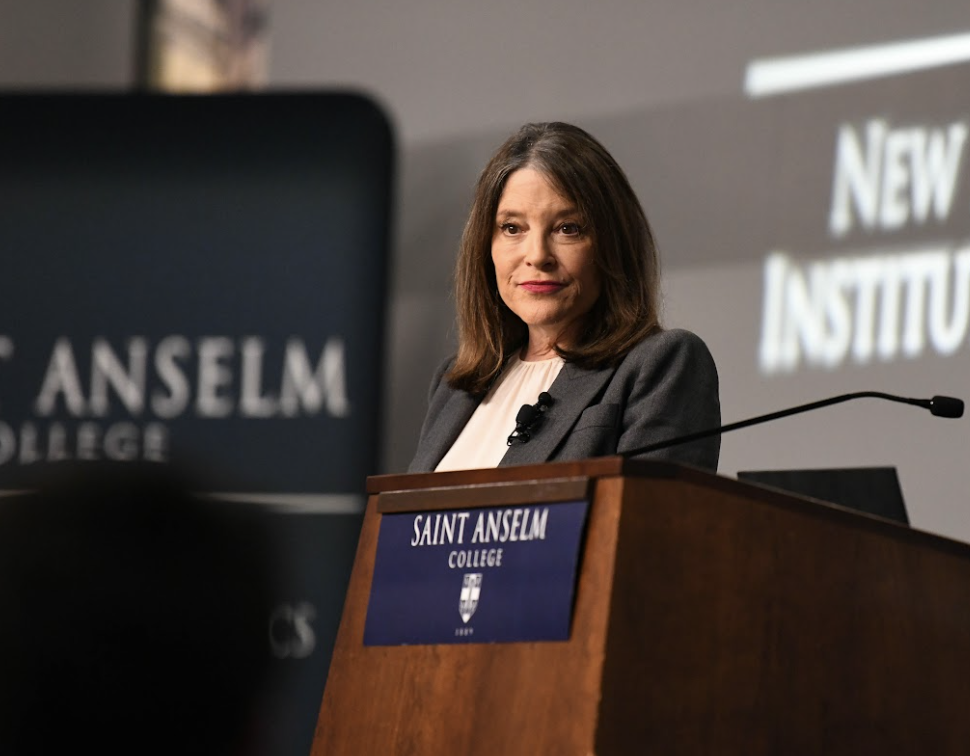This is the inaugural edition of a new series by the Crier where Jacob Akey, editor of the Opinion Section, will interview presidential candidates. These informal discussions will allow the Saint Anselm College community to better know those who want their votes. The Crier will publish full transcripts of these discussions, edited only for space and clarity. No context. No spin. No editorialization. No bias. Jacob’s (JA) first discussion is with Marianne Williamson (MW), an author and candidate for the Democratic presidential nomination. It was conducted on Oct. 4, after a Pizza and Politics event at NHIOP.
JA: First question, very serious; I want you to think a long time about it. What is your favorite flavor of ice cream?
MW: I knew it was going to be something like that. I think, upon deep analysis and sober reflection, I would have to say butter pecan.
JA: Most politicians don’t enjoy campaigning. Especially the presidential campaign, which has been described as grueling. What drew you back in?
MW: I didn’t want to spend the next year screaming at the television. And I didn’t want to ever look back and think I might have been able to help.
JA: How large is your New Hampshire operation?
MW: Four staff and an office in Manchester, and we’re going to get an RV. We’re going to have a traveling office. It’s going to be here within a week or so.
JA: Obviously, Lincoln is a big inspiration for you [MW: And Roosevelt], but it seems like this year, neither President Biden nor former President Trump have much interest in debates. Do you think that’s something that has been lost from American civic life?
MW: Yeah, you think. It’s not exactly the Lincoln-Douglas debates, is it? I very much regret the DNC’s resistance to my debating the President. I think it’s undemocratic.
JA: During the Republican primary debate, there was that final or penultimate question where they asked the candidates who they would vote off the island. If they had asked you at home watching, who would you have voted off that island?
MW: DeSantis.
JA: I saw that you majored in philosophy and theatre. Saint Anselm is a liberal arts college, and we put a lot of emphasis on the humanities. But, often nowadays, there are questions about the humanities’ place in the 21st century. What place do you think they have?
MW: I think you bring up something very important. I think it’s to the detriment of our society that there is such a diminished appreciation for the humanities. This is a product of the fact that we’ve become such a utilitarian society. So much emphasis on externalities at the expense of the arts, philosophy. It diminishes us as people. I think sometimes people would say, “Why would you major in the humanities? What are you going to ‘do with that?’” I’m going to be a broader person, a deeper person. I’m going to be more capable of insight and wisdom. That’s what’s lacking in our country today: insight and wisdom.
JA: Finally, given your background in spiritual life, I was wondering if you were familiar with the Bhagavad Gita? [MW: Of course.] JA: Every Saint Anselm freshman, as part of their freshman year humanities course, has to read the Bhagavad Gita. Did you take from it any lessons you would like to share with our students?
MW: I think the Bhagavad Gita expresses universal spiritual things. It’s about the dangers of the world, the destructive force in the world, and the ever-renewing regenerative power of the God within us all.


